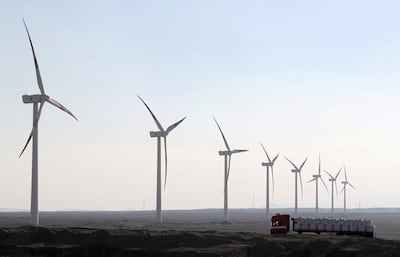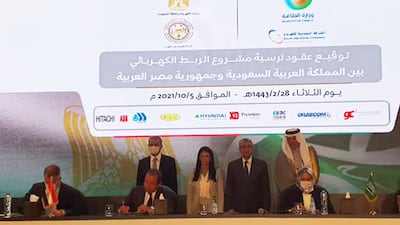Egypt and the Saudi Arabia signed $1.8 billion worth of contracts in Cairo on Tuesday to build transmission plants and connect each other's power grids.
The project will have a peak transmission capacity of 3,000 megawatts and will be implemented by three consortiums made up of international and regional companies, according to an Egyptian cabinet statement.
Saudi Energy Minister Prince Abdulaziz bin Salman and Egypt’s Minister of Electricity and Renewable Energy Mohamed Shaker signed the agreement for the venture led by the Egyptian Electricity Transmission Company and the Saudi Electricity Company.
“Reaching this important stage is the culmination of the directives of the leaderships of the two brotherly countries,” Prince Abdulaziz said at the accord ceremony, which was also attended by the chairmen of both the companies.
Under the agreement, two transmission plants will be set up in Saudi Arabia and one in Egypt.
The East Medina and Tubok plants in Saudi Arabia will be connected to the Badr plant, east of Cairo, by 1,350 kilometres of aerial cables and a 22-kilometre undersea network that will join both countries through the Gulf of Aqaba.
The high-voltage, direct current, or HVDC, system, with a voltage capacity of 500 kilovolts, aims to improve the efficiency and stability of both power grids, and clear a path for future ventures between the two countries.
The agreement will also boost their co-operation in renewable energy, Prince Abdulaziz said.

It will also reduce individual carbon footprints, according to Orascom Construction, which will build the link stations between the two countries.
Earlier this year, Egypt announced plans for similar power-sharing projects with Greece and Cyprus.
Under the current government, Egypt has gone from dealing with periodic power cuts to becoming a major regional player in the energy sector.
A similar joint project with Sudan was launched earlier this year, the first of phase of which generates 80 megawatts at peak times.


